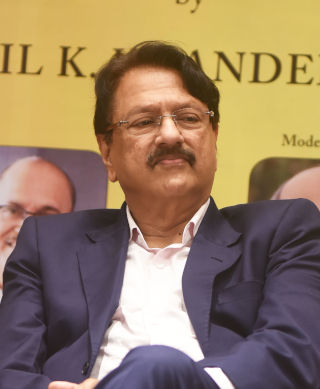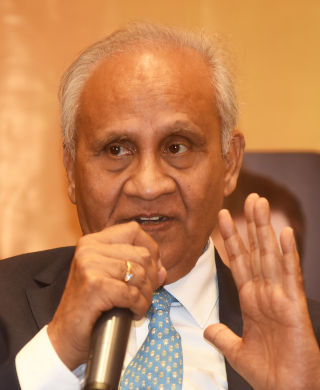[Video credits: Shutter Speed Productions; Camera team: Pramod Bodhare, Dinesh Mahimane, Nisar Hussain; Video edited by: Shatrughan Singh; Cover image and photos by Sanjit Kundu]
This conversation took place during the launch of Dr Anil Khandelwal’s book, The Gym of Leadership, in Mumbai on 27 November 2024.
The three panelists spoke of their leadership journeys—and the essential characteristics that set leaders apart from bosses.
Highlights from the conversation
(Edited for brevity. You can scroll the video to the timestamp to listen to each segment)
On life after "retirement": Moving to the next phase of life.
2.30 - 8:05 Nitin Paranjpe: Earn, learn, return and yearn
If I was to try and split it into four quadrants, the first quadrant would be what would I do today to earn? The second quadrant is what would I do to learn—also to stay relevant? The third is return—to give back. The fourth quadrant is yearn—what do I want to do for myself?
8:06 - 13.20 Ajay Piramal: Bridging the income gap
The gap in per capita income between east and west India is huge. The west’s per capita is 2.2 times that of the east. If all these five or six states in the east were a separate country — and these have 250 million people — their development indices would be among the worst in the world. How can we improve this? That is our big hairy audacious goal. How can we lift these people through creating a global alliance of large corporates, large foundations?
13.21 - 16.34 Dr Khandelwal: Physical fitness and spiritual fitness
I have seen four compartments of leadership: physical fitness, intellectual fitness, emotional fitness, and spiritual fitness. I am on the first and fourth. I pay a lot of attention now to physical fitness — if I don't exist what are we planning? I have used the Gita extensively, for example for emotional equanimity. I find so much wisdom in this — we don't have to go to Harvard to learn management and leadership.
How the new generation thinks and behaves, and being grounded
16:35 - 20:31 Piramal: Some values are eternal
One is integrity. What you think, you speak and you do the same thing. The other important thing is to have the courage to do things that are different, follow the path less traveled. The third is, to be a leader you have to be humble, authentic, and vulnerable. Nobody can know everything and you have to be constantly learning.

[Ajay Piramal, Chairman, Piramal Group]
Equanimity — there's nobody in the world who's not gone through an up and a down in life. Ram went through difficulty; Krishna was born in difficulty. Why are these examples given? To let us know that everybody has to go through it.
20:32 - 22:49 Paranjpe: If everything is changing, you have to be stable
This is a generation which has more self-belief, more confidence, a degree of impatience, and a degree of healthy irreverence which allows them to question and challenge. They’re living in a world which is more stressful, which is more uncertain. Not enough of them spend time on self-mastery.
22:50 - 25:29 Piramal: The Gita is the best leadership book
The Gita says that like in the sea the wave goes up, it comes down as well. If you look at the sea at a distance, you don't see anything. You can't be very elated because the more high you go, the more you feel low. Recognise that you are human and you will make mistakes. And this has not changed for 10,000 years.
The Gita is the best leadership book in the world. The Gita was spoken in the midst of a battlefield to a young person, Arjuna. It's relevant for every one of us.
Human-centred leadership and doing the right thing
25:30 - 31:28 Paranjpe: Why are these several thousand people going to lose their jobs for no fault of theirs? Can't there be a better way?
[When the financial crisis struck, instead of downsizing, Bob Chapman, chairman and CEO of Barry-Wehmiller, asked if they would be okay taking four weeks of unpaid leave.] But, he said, ‘This is not the last crisis we are going to have. I can't go back to our people every few years and say take four weeks of unpaid leave.’ He came up with other ideas which were hard business processes — with the philosophy that people come first.
Most large organisations take the easy option — and I've been guilty of that. When people lose their jobs, it's usually the mistakes of senior leaders.

[Nitin Paranjpe, former CEO of Hindustan Unilever]
31:29 - 32:50 Dr Khandelwal: Take a risk with people
We often take huge amounts of risks in business but we don't take so-called risks with people — in believing in them. That is the time to show conviction, your authenticity, your credibility. And at the end of the day you still have to take that tough decision.
Investing in people and building trust
32:51 - 36:05 Piramal on long-term value
If you have a value-based life or a value-based business, you create huge economic value in the long term.
We acquired a small multinational, Nicholas Laboratories… They needed their IP to be protected, which means when we acquired it we said we will not export — which meant in the short term we incurred an economic loss. But subsequently every single multinational which exited out of India came to us as the first port of call at a value which was lower than what others were willing to give.
36:06 - 37-51 Piramal on asking people to leave
I was thrust into running a textile company employing about 8-10,000 people. During the Datta Samant strike, I went in front of 3,000 people and I said you can go on strike but you have to recognize that the company will not survive. I think people understood. You have to say the truth and people then believe you over time.
37:52 - 40:40 Paranjpe on short-termism vs. sustainable change
This whole thing about short-termism — I've been guilty of that a couple of times. In 2000 - 2001 I had 14-15 very good years and maybe I'd become complacent and cocky and I thought others haven't fixed it, I'll fix it…. I tried tactical stuff; I didn't address the real issue and for the next two years I never delivered on anything that I had said I would — a singular failure. At the end of two years of trying clever tactical stuff I [said] don't worry about what will happen just do the right thing. That was a liberation. When the results came they were more sustainable.
How to pick a great leader
40:41 - 42:42 Piramal on values alignment
When I meet somebody I need to get comfortable with their values aligned with mine. I have had examples where for a long time I've seen that the values are not there but I've said it'll happen — it doesn't ever happen and we've paid the price.
42:44 - 44:39 Paranjpe on the five qualities
I would think of five qualities: given how volatile and uncertain this world is you need people with resilience and resilience requires them to be self-aware, centered. The second is, given how complex and interconnected this world is, you need people who have a little bit of systems thinking — connecting dots and humility. Then you have to have hunger. Do you care enough to want to make a difference? And lastly, character.
44:40 - 46:49 Dr Khandelwal on being responsive and accountable
I always looked for people who are responsive, who are not apathetic — in relation to the people they work with, and to customers. Second is credibility — do they feel accountable to people? And third is vulnerability…
It is not easy to face 3,000 militant people and make them listen to you. It is not the power of your authority; it is the power of your influence and authenticity.

[Dr Anil Khandelwal, author and former chairman & managing director, Bank of Baroda]
Do great leaders also have to be great followers?
46:49: We speak a lot about authenticity but people seem to love leaders who have clarity and who are strong willed and who says I know how to get there follow me. - Prasenjit Bhattacharya, founder director, Great Place to Work Institute India
49:05 - 52:19 Paranjpe: Leaders are the best followers of their belief system
If what they believe in is inspiring, compelling, other people observing it say wow I like what he stands for. That leader gets willing followership…
If Mahatma Gandhi had started off on his Dandi March and found that nobody was behind him, would he have stopped after a kilometer or two or five?...
Authenticity is a necessary condition for you to become a leader… I do think leaders have a role in instilling belief and hope and build confidence. But saying I know we will succeed is different from saying I know exactly how to get there.
On disciplined reflection
52:20: Is there something we can learn from the smaller towns and villages on leadership? - Prof Jagdeep Kapoor, JBIMS
54:02 - 56:51 Dr Khandelwal on teaching leadership
You can't teach a man who is becoming a general manager how to manage your time or how to be people-centric. Because by that time they have formed their own opinions. It is ridiculous that for most leadership training is holidaying. This is like selling lollipops of leadership.
56:52 - 59:39 Paranjpe on the discipline to change
At the age of 30 - 40 - 45 it is very hard to change some of these. There is a reason you are who you are, there is an implicit belief system that you have. To try and address those without the discipline which is required, like going to the gym — it's not an understanding deficit; it is that deep inner desire.
59:17 How much of a role would fitness play in leadership? - Charles Assisi, co-founder, Founding Fuel
59:56 - 1:00:36 Paranjpe on managing energy
I think physical fitness matters, but mental health matters more… If you can't manage your own energy, you can't do what's [important]
1:00:37 How do you lead when you don’t have explicit authority?
1:00:48 Paranjpe on leaders vs. bosses
This explicit authority is not of a leader, it is of a boss who has subordinates. Leaders have willing followers.
Organizations don't create leaders… If you don't have that stature to command respect based on who you are and what you stand for, you don't deserve to be in the chair.
On family values
1:02:36 The underlying theme — values, character, authenticity, credibility — isn't there something more that the entire set of stakeholders can do? - Prof Pramod Solanki
Dr Khandelwal: My mother used to tell me, never go back on your words. And every time in decision making something happens, that ‘okay I told him [I’ll do something] but it's difficult to do’, my [mother’s words] will strike from somewhere.
